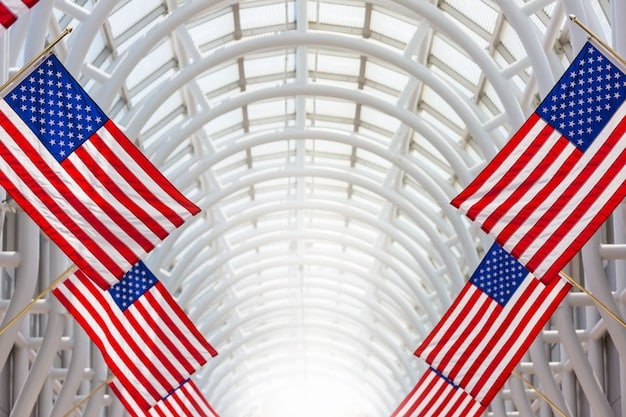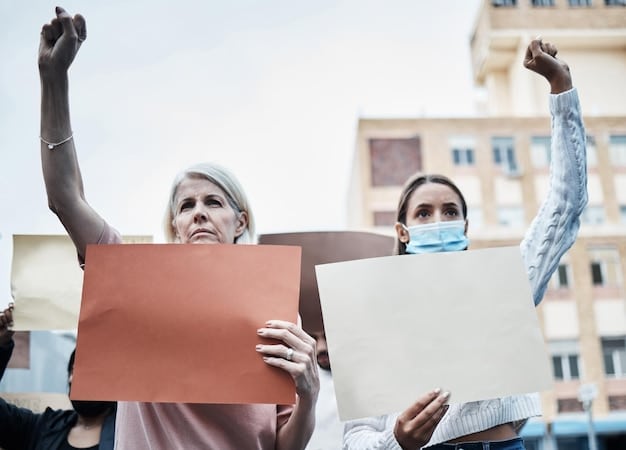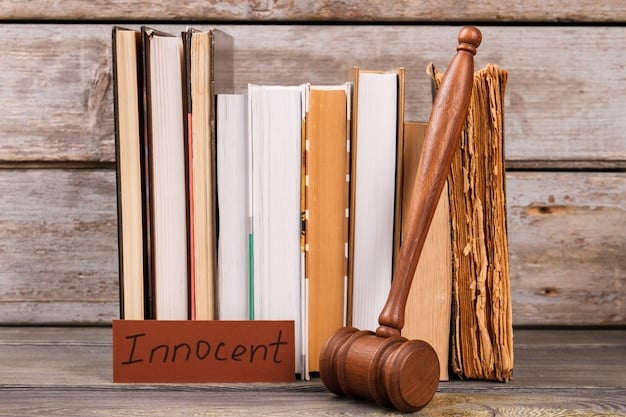US Role in International Human Rights: A Comprehensive Examination

The US Role in International Human Rights: Examining the Country’s Efforts to Promote and Protect Human Rights Worldwide is a multifaceted endeavor, involving diplomacy, sanctions, and aid programs aimed at fostering global respect for human rights.
The US Role in International Human Rights: Examining the Country’s Efforts to Promote and Protect Human Rights Worldwide has been a subject of intense debate and scrutiny. While the United States has often positioned itself as a champion of human rights, its actual record is complex and marked by both successes and shortcomings.
This article aims to provide a comprehensive overview of the US’s involvement in promoting and protecting human rights on a global scale, examining the various mechanisms and strategies employed, as well as the challenges and criticisms encountered. Understanding the US Role in International Human Rights: Examining the Country’s Efforts to Promote and Protect Human Rights Worldwide requires an in-depth look at its foreign policy, international agreements, and domestic laws.
Understanding the Historical Context of US Human Rights Policy
The US’s approach to international human rights has evolved significantly over time, influenced by domestic political considerations, geopolitical strategies, and changing global norms. Understanding this history is crucial for evaluating the current US Role in International Human Rights: Examining the Country’s Efforts to Promote and Protect Human Rights Worldwide.
Early Influences and the Cold War
The aftermath of World War II saw the rise of the United Nations and the Universal Declaration of Human Rights in 1948. While the US played a role in drafting this declaration, the Cold War shaped its subsequent human rights policy. The US often prioritized strategic alliances over human rights concerns, particularly when dealing with authoritarian regimes that aligned with its anti-communist agenda.
- The Universal Declaration of Human Rights: A foundational document for international human rights law.
- The Cold War: Shaped US foreign policy and its approach to human rights.
- Strategic Alliances: Often took precedence over human rights considerations.

During this period, the US also faced internal challenges regarding civil rights. The struggle for racial equality within the US influenced its credibility on the international stage and added complexity to its human rights diplomacy. The tension between promoting human rights abroad and addressing domestic inequalities continues to shape the US Role in International Human Rights: Examining the Country’s Efforts to Promote and Protect Human Rights Worldwide.
In conclusion, the historical context reveals a complex interplay of factors that have shaped the US approach to international human rights. The Cold War, domestic challenges, and evolving global norms have all played a role in defining the US Role in International Human Rights: Examining the Country’s Efforts to Promote and Protect Human Rights Worldwide.
Key Instruments and Policies of the US
The US employs a variety of instruments and policies to promote and protect human rights globally. These range from diplomatic initiatives and economic sanctions to foreign aid programs and legal frameworks. Analyzing these tools is essential for understanding the US Role in International Human Rights: Examining the Country’s Efforts to Promote and Protect Human Rights Worldwide.
Sanctions and Trade Policies
Economic sanctions are frequently used as a tool to pressure governments that violate human rights. The US can impose targeted sanctions on individuals or entities responsible for abuses, as well as broader trade restrictions on entire countries. However, the effectiveness and ethical implications of sanctions are often debated.
Trade policies also play a role. The US can condition trade agreements on human rights performance, seeking to incentivize improvements in labor rights, freedom of expression, and other areas. These conditions are often included in free trade agreements and other international economic partnerships.
- Targeted Sanctions: Aimed at specific individuals or entities.
- Trade Restrictions: Broader measures affecting entire countries.
- Human Rights Conditions: Included in trade agreements.
In addition to sanctions and trade policies, the US provides substantial foreign aid to countries around the world. A portion of this aid is specifically earmarked for programs that promote democracy, good governance, and human rights. These programs often support civil society organizations, independent media, and legal reforms.
Ultimately, the effectiveness of these instruments depends on careful implementation and a clear understanding of the local context. The US Role in International Human Rights: Examining the Country’s Efforts to Promote and Protect Human Rights Worldwide requires a nuanced approach that considers both the potential benefits and unintended consequences of its policies.
The US and International Treaties
The US’s relationship with international human rights treaties is a complex and often criticized aspect of its human rights policy. While the US has been involved in drafting many international agreements, it has been selective in ratifying them. This selectivity raises questions about the US Role in International Human Rights: Examining the Country’s Efforts to Promote and Protect Human Rights Worldwide.
Treaties Ratified and Reservations
The US has ratified some key human rights treaties, including the International Covenant on Civil and Political Rights (ICCPR) and the Convention Against Torture (CAT). However, it has often attached significant reservations, understandings, and declarations (RUDs) to these treaties. These RUDs limit the scope of the US’s obligations under international law.
The US has not ratified other important treaties, such as the Convention on the Rights of the Child and the Convention on the Elimination of All Forms of Discrimination Against Women (CEDAW). This non-ratification is often attributed to domestic political opposition and concerns about potential conflicts with US law.

- ICCPR: The International Covenant on Civil and Political Rights.
- CAT: The Convention Against Torture.
- RUDs: Reservations, understandings, and declarations that limit treaty obligations.
The impact of these reservations and non-ratifications is significant. Critics argue that they undermine the US’s credibility as a champion of human rights and weaken the international human rights system. Defenders argue that they are necessary to protect US sovereignty and constitutional principles. Understanding the US Role in International Human Rights: Examining the Country’s Efforts to Promote and Protect Human Rights Worldwide requires a critical assessment of its treaty practices.
In conclusion, the US’s relationship with international human rights treaties is marked by both engagement and reservation. Its selective ratification and use of RUDs reflect a complex balance between international obligations and domestic concerns. This balance continues to shape the US Role in International Human Rights: Examining the Country’s Efforts to Promote and Protect Human Rights Worldwide.
Criticisms and Controversies
The US’s human rights record is not without its critics. Both domestic and international observers have raised concerns about various aspects of US policy and practice. Addressing these criticisms is essential for a balanced understanding of the US Role in International Human Rights: Examining the Country’s Efforts to Promote and Protect Human Rights Worldwide.
Double Standards and Hypocrisy
One frequent criticism is that the US applies double standards in its human rights policy. Critics argue that the US is more likely to condemn human rights abuses in countries that are adversarial to its interests while overlooking or downplaying abuses committed by allies. This perceived hypocrisy undermines the US’s moral authority and credibility.
The US’s own human rights record also comes under scrutiny. Issues such as police brutality, mass incarceration, and immigration policies have drawn criticism from human rights organizations. These domestic challenges can weaken the US’s ability to advocate for human rights abroad.
Another area of controversy is the US’s involvement in military interventions and counterterrorism operations. Critics argue that these actions have often resulted in civilian casualties, human rights violations, and destabilization of regions. The US’s use of drones, detention policies, and support for certain regimes have also been criticized as inconsistent with its stated commitment to human rights.
Ultimately, addressing these criticisms is essential for strengthening the US Role in International Human Rights: Examining the Country’s Efforts to Promote and Protect Human Rights Worldwide. Acknowledging shortcomings, promoting accountability, and adopting a more consistent and principled approach can enhance the US’s credibility and effectiveness in promoting human rights globally.
The Impact of US Foreign Policy on Human Rights Worldwide
The impact of US Role in International Human Rights: Examining the Country’s Efforts to Promote and Protect Human Rights Worldwide is both direct and indirect. Direct actions include sanctions, foreign aid, and diplomatic interventions. Indirect impacts stem from its influence on global norms and institutions.
Promoting Democracy and Good Governance
The US often aims to promote democracy and good governance as a means of advancing human rights. Support for free and fair elections, independent media, and civil society organizations are common components of US foreign policy. However, the effectiveness of these efforts is often debated, and some interventions have had unintended consequences.
US foreign policy can also have negative impacts on human rights. Support for authoritarian regimes, military interventions, and economic policies can inadvertently contribute to human rights abuses and instability. Therefore, it is essential to carefully assess the potential consequences of US actions and adopt a do-no-harm approach.
- Sanctions: Impose costs on human rights abusers.
- Foreign Aid: Supports human rights programs.
- Diplomatic Interventions: Can address specific abuses.
In conclusion, the US Role in International Human Rights: Examining the Country’s Efforts to Promote and Protect Human Rights Worldwide has a multifaceted impact on human rights around the world. Its actions can both promote and hinder human rights, depending on the specific context and policies employed. A nuanced understanding of these impacts is essential for effective human rights advocacy.
| Key Point | Brief Description |
|---|---|
| 📜 Historical Context | US human rights policy evolved due to Cold War, domestic issues. |
| ⚖️ Key Instruments | Sanctions, trade policies, and foreign aid are used to promote human rights. |
| 🌍 International Treaties | Selective ratification impacts US’s role; significant RUDs. |
| 🤔 Criticisms | Double standards, hypocrisy, and military actions draw scrutiny. |
Frequently Asked Questions
The US aims to promote and protect human rights through diplomacy, sanctions, foreign aid, and support for international institutions. However, its approach varies based on geopolitical and domestic considerations.
Key instruments include targeted sanctions, trade policies conditioned on human rights performance, and foreign aid earmarked for democracy and good governance programs.
Criticisms include applying double standards, overlooking abuses by allies, and engaging in military actions that lead to civilian casualties and human rights violations.
The US has ratified treaties such as the International Covenant on Civil and Political Rights (ICCPR) and the Convention Against Torture (CAT), often with significant reservations.
The US influences global norms through its diplomatic engagement, support for international institutions, and the example it sets (or fails to set) with its domestic policies.
Conclusion
In summary, the US Role in International Human Rights: Examining the Country’s Efforts to Promote and Protect Human Rights Worldwide is a complex and multifaceted endeavor. While the US often positions itself as a champion of human rights, its actual record is marked by both successes and shortcomings.
Addressing criticisms, promoting accountability, and adopting a more consistent and principled approach can enhance the US’s credibility and effectiveness in promoting human rights globally. A continuous effort to align its actions with its stated values is essential for strengthening the US Role in International Human Rights: Examining the Country’s Efforts to Promote and Protect Human Rights Worldwide.





